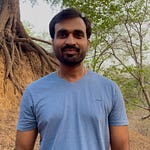The Tracking Indian Youth Workers Media Fellowship presents the next in a series of stories capturing the lives of young workers across India.
Asmat Ali, 22 years old, chose an unconventional path—leaving his hometown in Assam to become a kayaking instructor in Kerala. What began as a vacation experience turned into a career through his family’s support. In this conversation, he talks about learning to navigate not just water, but also life.
“I had never imagined living outside my hometown for work, and the idea of becoming a kayaking instructor was completely new to me. One big lesson I’ve learned is that how you deal with the real world matters a lot more than just your degrees and marks. I’m not saying education isn’t important, but knowing how to apply what you learn in school is what really tests your knowledge.”
Read his full story below. Profile by Vaishnavi Bhat.
Vaishnavi: Can you please tell us about yourself?
Asmat: My name is Asmat Ali and I am 22 years old. I’ve been working as a kayaking instructor at Ben’s Cruise and Homestay in Kochi since 2022. I grew up in Darrang, Assam, where my family still lives. I’m the youngest of five siblings. My father runs a provision store and my mother is a homemaker.
Vaishnavi: How did you choose your profession as a kayaking instructor?
Asmat: Around three years ago I had come to Kerala with a friend for a vacation. We were only around 19 then and still figuring out what to do in life. That’s when we tried kayaking for the first time at a riverside in Alleppey. We stayed there for four days and by the end, we got pretty good at it. It’s a matter of practice and logic—once you get that, kayaking becomes a cakewalk.
But honestly, I didn’t think of making it a profession until the instructor there told me I could be good at it. I was hesitant because I had never imagined living outside my hometown for work, and the idea of becoming a kayaking instructor was completely new to me. I had no real knowledge about it.
Back home in Assam, I mentioned it to my father—surprisingly, he encouraged me to give it a shot. With my family’s support, I got in touch with kayaking instructors in the Sundarbans and enrolled in a month-long training program. Looking back, that training was really helpful. They teach you things about kayaking and navigating water that you may think aren’t important, but are actually crucial—especially because we are literally responsible for people’s lives out there.
After that, I went to the National Institute of Watersports (NIWS) in Goa to get my license. I specifically wanted to work in Kerala, as I’d heard kayaking is a year-round business here. Unlike the Sundarbans, where it’s seasonal and doesn’t attract as many mainstream tourists, Kerala offers more consistent opportunities.
Vaishnavi: How has your experience been so far, both as an instructor and living in a completely different place?
Asmat: I’ve adapted quite well to life here now. In the beginning, I did miss home a lot, but when you’re busy and enjoy what you’re doing, you start looking forward instead of backward. The friend who came with me also works as a kayaking instructor in Alleppey, and we supported each other during those early days.
We have nearly 25 boats here and on average, we get about 20 customers daily—both morning and evening sessions. It gets a bit difficult when I have to manage everything on my own, especially with many first-timers who need constant monitoring. It’s tiring, especially with the heat and three-plus hours of rowing. Thankfully, during weekends, we have an assistant who helps coordinate everything smoothly.
Vaishnavi: What have the past years as a working adult taught you?
Asmat: I think that differs from person to person. For me, my family has always supported my decisions—even when things didn’t go as planned. That’s given me the confidence to try new things, and I’m really grateful for that.
One big lesson I’ve learned is that how you deal with the real world matters a lot more than just your degrees and marks. I’m not saying education isn’t important, but knowing how to apply what you learn in school is what really tests your knowledge.
In this line of work, developing leadership and communication skills is essential. You can have all the licenses and equipment, but what’s the point if you can’t attract customers or run the business side of things? I struggled with that at first—it took me months to learn Malayalam and to speak comfortably with customers.
Now, most of my customers come through recommendations. I’ve realized that creating a good connection with people during those 2.5 hours of kayaking goes a long way in building trust and a strong impression.
Vaishnavi: Do you have any advice for young people like you who are trying to join the workforce in India?
Asmat: My advice would be—don’t be afraid to try something different. Sometimes the best opportunities come from places you never expected. It’s okay to not have everything figured out right away. What matters more is being open to learning and giving things a fair shot.
Also, take your time to build real skills. People often underestimate soft skills like communication, patience, or being responsible—but those are what will help you in the long run. And wherever you go, always stay grounded. Keep your family close, because that emotional backing really matters, especially when you’re far from home and trying something new.
This is an ongoing series of profiles documenting the experiences of young people across India. Stay tuned for more stories from young workers across India. Follow us on social media for more updates.









